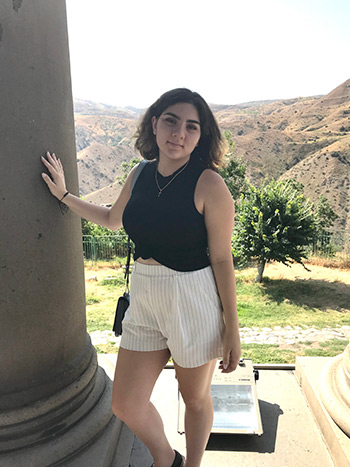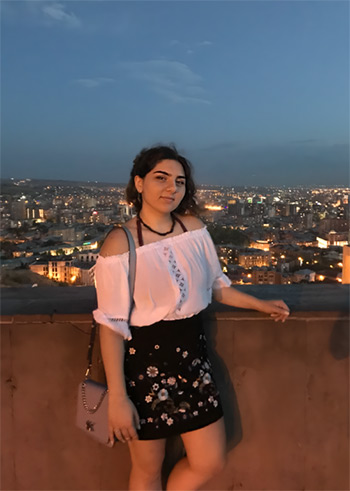More than 100,000 people have fled Nagorno-Karabakh on the heels of a military offensive by Azerbaijan that many international observers call a form of ethnic cleansing. An autonomous ethnic Armenian enclave within Azerbaijan, Nagorno-Karabakh is now virtually abandoned.

Azerbaijan blocked the only road between Armenia and Nagorno-Karabakh to all traffic except Red Cross aid vehicles in December 2022. In June those were also barred, reportedly leading to starvation conditions. After the recent military offensive, Nagorno-Karabakh’s government agreed to dissolve after over 30 years of separatist rule and now Armenia — a country of 2.8 million — is struggling to absorb and assist the massive influx of refugees.
For Berkeley Law 3L Margarita Akopyan, an Armenian immigrant whose relatives lived in the region, the conflict hits home. When she was 6, she came to the United States from Russia, where her mother had moved for job opportunities and her father had moved as a refugee.
Attacks in Nagorno-Karabakh in 2020 fueled Akopyan’s interest in international law. During law school she has worked with the California Asylum Representation Clinic and the Berkeley Law Afghanistan Project, and she is currently senior development editor for the Berkeley Journal of International Law.
Also a former research assistant for Dean Erwin Chemerinsky, Akopyan describes how the past conflict in Nagorno-Karabakh and the recent upheaval there has shaped her path:
* * * * *
Throughout high school, I knew I wanted to go to law school and become a public defender. Growing up as a low-income Armenian immigrant, I saw a need for more diversity in legal representation, especially in areas like public defense where all clients come from low-income backgrounds and many are immigrants and people of color. My goal was to provide clients with representation that could better understand both the issues they face and how to assist with those issues.
But in October 2020, during my law school application cycle, Azerbaijan, the country directly east of Armenia, launched an attack on Armenian villages in the Artsakh (Nagorno-Karabakh) region. From 1991 to 2020 Artsakh was an autonomous region largely surrounded by Azerbaijani territory. Many of my relatives lived here.
What became known as the Second Nagorno-Karabakh War lasted into November and resulted in the destruction of most of the Armenian villages and the death of thousands. Throughout the attack, Azerbaijan committed countless war crimes and human rights violations, including using white phosphorus (a bomb additive banned by the United Nations) and targeting hospitals.

These devastating events led me to shift focus from marginalized groups in the United States to marginalized groups internationally. By the time I arrived on campus in the fall of 2021, I had decided to use my legal education to defend the human rights of my people in Artsakh and all others being stripped of their fundamental human rights.
As I entered my 3L year, the situation in Artsakh has only worsened. In December 2022, Azerbaijan blocked the Lachin corridor, the single road connecting Artsakh to Armenia and the only access point Artsakh has to essentials like food and water. For nine months, the Artsakh population starved, lacking electricity and access to proper medicine.
In September 2023, Azerbaijan launched another full-scale attack on Artsakh that caused almost the entire population to become refugees, fleeing to Armenia. Today, almost no Armenians remain in Artsakh, and the Republic of Artsakh is set to be dissolved.
As I’ve watched the international community fail to intervene to stop Azerbaijan’s campaign of ethnic cleansing, I find myself about to graduate law school — with the place I entered law school to defend on the brink of dissolution.
Berkeley Law has given me the opportunity to learn about these different struggles for autonomy and human rights around the world, and to spread awareness to my classmates and professors about the struggle of the Armenian people.
During my time at Berkeley Law, I have participated in the Berkeley Afghanistan Project and the California Asylum Representation Clinic, where I assisted survivors of human rights violations in navigating the asylum process. During my first summer, I worked at the American Bar Association Immigration Justice Project, where I was able to use my Russian language skills to speak with asylum seekers in their native tongue.
I am also on the boards of the Berkeley Journal of International Law, where I curated and edited articles regarding international law, and the Middle Eastern and North African Law Students Association, where I can provide Armenian representation and help educate fellow students on struggles that are unique to the Armenian community.
In the next month, I will be meeting with Armenian prelaw students from UC Berkeley and UCLA to help them navigate the law school process and encourage them to apply to Berkeley Law in hopes of increasing Armenian representation on campus. I am excited at the prospect of increasing Armenian representation not just on campus, but also in the legal community.